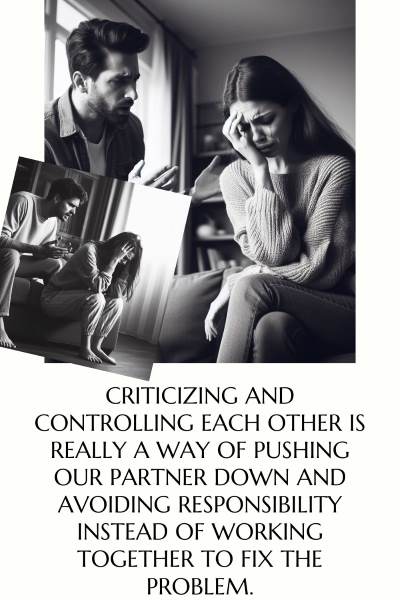Here are 7 traps that can wreck marriages during stressful times and how you can avoid them.
How to Cope with Stress and Challenges in Your Marriage: 7 Traps to Avoid
A happy and rewarding marriage is the ultimate goal right? But what happens when life and the real world through some real challenges in your way?
Marriage is a complex relationship and is one in which our bonds grow deeper as time grows on if, we put in the effort and energy to make it happen.
But if we don’t, our marriage can become one full of stress, resentment and worse.
And the truth is that real life will put huge challenges in your way and how you cope with those will play a huge role in determining how your relationship endures. It doesn’t matter whether it is a health issue, finances, or family drama.
When my wife first became ill, it was a huge stress. Suddenly she was becoming weaker and less able to do the things she did before. Medical bills started coming in quick and so did the stress of thinking about a future that may not have her in it.
But those things aren’t where our lives stop and we must push through for our loved ones and for ourselves.
Nearly half of marriages end in divorce and for many it was never some huge disaster that happened but just a growing list of small traps we’ve fallen into that add up to huge stress and resentment toward each other.
So below I put together a list of the 7 most common marriage traps to avoid. I built the list looking back at my own experience with couples, some of the real potholes I have fallen into in my own marriage, and from real research done on marriage satisfaction.
Trap #1: Ignoring the Problem
The worst thing you can do with a problem or an issue in your marriage is to ignore it and pretend it’s not there.
This may seem like an easy way to avoid conflict or discomfort, but it can actually backfire in the long run.
Think back to a time there was an issue you and someone both knew about but didn’t want to discuss. It makes you feel more distant from them doesn’t it? And that’s because as we try to avoid the issue we also tend to avoid the person and talking about things with them like we should.
To avoid this in my own marriage, my wife and I put in place a monthly check in discussion specifically to give us a time and place to get into the hard talks about any issues in our relationship.
And for the first few times it will be hard and awkward but this will absolutely better the communication in your marriage and start breaking down those barriers we put up.
Trap #2: Blaming Each Other
The next most common and easy trap to fall into is the blame game.
Blaming your partner for something that’s happened is the single fastest way to start building up resentment towards them. And it’s generally a way for us to try and avoid our own responsibility.
Blaming quickly becomes a cycle and that circling through accusations, getting defensive and then building up resentment destroys the love, trust and respect in a marriage.
Instead of blaming each other, you should each focus on taking responsibility for your own actions and emotions. And when your partner does something that gets under your skin, know that it wasn’t some personal attack, but just a mistake.
Most of the issues that crop up in a marriage are really opportunities to grow and evolve with your spouse together.
You have to trust that your partner acts in good faith for your marriage or your relationship can never truly grow deeper.

Trap #3: Avoiding Intimacy
One of the most dangerous traps that couples fall into when they are under stress is avoiding intimacy with each other.
A now famous study from Georgia State University showed that 16% of marriages had not had sex in the month prior to the study being done. And the part of the study nobody ever discusses, but that’s even worse than just that statistic, is the fact that of the couples in the study, most were at the point where they felt stuck with no drive to change it or even leave.
The study showed that we can go our lives in a marriage that has no desire in it and feels loveless and is full of resentment because that too feels like a trap we get stuck in.
But it doesn’t have to be and if you’re in a place like that you can come back and you can bring the fire of desire back to a roaring blaze of intimacy, but it takes work.
Intimacy can be physical or emotional and doesn’t have to be sexual in nature. Close cuddling and talking can be an intimate moment that brings you closer.
But when you’re in the middle of a challenge, especially if your upset with your partner, it’s easy to pull away and withhold intimacy as one part defense mechanism and one part a way of getting back at them.
But the truth is that during stressful times intimacy can be a comfort that pulls you through. It can be one of the things that keeps the fire of desire between you burning bright.
In fact, intimacy can be learned to the point of where it just is a part of your marriage, like a habit.
Instead of avoiding intimacy with your partner, you should try to maintain or increase it when you are under stress. Try to go out of your way to be close to them and express your love and let those feelings carry you through the stress.
You can use initiating intimacy as a tool to show your partner that even though you may be in a tough spot, your love is still there, and you still appreciate them and everything they bring into your life.
Trap #4: Withdrawing or Isolating
When I was young, before college, studying psychology and getting onto a personal growth journey, I had the tendency to withdraw in a stressful or challenging point in our relationship. And it never made anything better.
If I had gotten into an argument with my partner I would almost hide away in my office or doing something away to give her some space. I thought it was giving time for things to cool down but in reality it often gives us time to stew over whatever offended us and get even more locked into our position.
You have to confront the situations if you ever want to truly work through them.
Just like how hiding the problem or ignoring it only makes it worse, withdrawing from your partner does that plus makes them feel unloved and unheard.
When a big challenge or stressful situation comes up, try to lean into each other and rely on your partner. Even if you’re mad at them make them know that you still love them.
If you can come together, you can turn the situation into something that strengthens your relationship.
And a few easy ways to do this are to simply come up and let them feel your love. Hug or kiss them and tell them you appreciate them even when times are tough.
Trap #5: Comparing or Competing
Another common trap that couples fall into when they are under stress is comparing or competing with each other or with others.
Comparing or competing can be a way of coping with stress by seeking validation or motivation, but it also hurts our self esteem and our relationship. And it’s because comparisons bring jealousy, insecurity and resentment.
It builds an environment of hostility and negativity in your relationship when it should be one of peace and joy.
So, what do you do? It’s easy, when you’re going into or in, a stressful situation, try to appreciate and cooperate with each other.
I know that sounds a lot easier than it is, but in reality, you want to be there for your partner and your partner wants to be there for you. You chose each other and need to take a step back sometimes to remember that you can lean into them for the support you need.
It takes vulnerability to open up and reach out to someone in a way that shows them appreciation especially if they are the reason for your stress. But if you can, it shows them your care for them as well as your need for them. And that’s powerful.
When we feel wanted and needed by our partner it makes us want to step up and support them. I think we naturally have a drive to try to be there for those we love and if we can open up to our partner we will see they have that same drive in them.

Trap #6: Criticizing or Controlling
The next trap I almost want to look at as a kind of woman/man split trap we can fall into and it all comes down to the kind of personality traits we each individually have.
Men typically take on personality traits that are more associated with aggression and dominance, this isn’t anything new to the psych world. But when we are in a relationship and in moments of stress, it can lead to controlling behavior.
And both of these can quickly become cycles of hurting our partner and our relationship. So what do we do instead?
We have to look at how we are behaving objectively by taking off the rose-colored blinders and asking ourselves first: what did I do to contribute to the situation. And second: how can I let my partner know what they need to fix or do in a constructive way that uplifts them.
And alot of this comes from acceptance and taking responsibility for you and empowerment that comes from the ability to actually fix things with better communication.
The research shows even deeper impacts of criticizing. In a study published in the journal PLOS One shows that even if we think we are not really criticizing our partner, our partner’s perception of us criticizing them can negatively affect our marriages.
Instead of criticizing your partner’s actions, let them know how those actions make you feel so they can see outside their own point of view.
Instead of trying to control what your partner does, let them know how the behaviors you do or don’t want them doing make you feel so they can understand where you’re coming from and why it’s important to you.
Trap #7: Escaping or Coping Unhealthily
How often do we just want to get away from a stressful situation or get back to somewhere peaceful for us when we know there is an issue that needs to be addressed.
I called escaping and coping unhealthily the same tap here because when you try to escape from an issue or from your partner when they either have an issue or want to address one, is really a way for us to try and convince ourselves we are coping fine even though we’re not.
A couple I had known and worked with for years had this cycle where any time an issue would arise, they would dive off into some fun experience and instead of being addressed the issue would be swept under some fun time and forgotten.
But issues aren’t really forgotten in relationships, they’re just hidden for a moment.
And after a while the issue that had become an expensive night at the bar or a impromptu mini vacation or toy purchase would come back up and the cycle would start again.
Escaping an issue never fixes it. But if you can take that same energy and focus it on the issue purposefully looking to address the source of it and not just the symptoms, you can work through them.
A quick example would be the couple taking the night they would have spent out partying to escape an issue that could become a fight, which would eventually anyhow. They could take the night and be together in their home and have an open and honest discussion about working through it.
The key is to remember that when you take an issue head on, and look at it objectively with your partner, you open the doors to working through it and growing your marriage into something better.
Conclusion
Stress and challenges are inevitable in any marriage, but they don’t have to become a cycle of resentment, pain and eventual divorce.
If you can start by simply looking at these 7 traps and working to actively avoid them, half the battle is already over and the path to a healthier marriage will already be clear.
Taking these and turning them into growth opportunities can also strengthen your marriage and grow your bonds deeper as well as helping to keep the intimacy alive.
And of course, if you are in a spot where your marriage is suffering and you just can’t seem to get through it, seek out a professional.
Don’t listen to your friends of family which may very well make things worse, talk with someone like a counselor or therapist who is objective and can look at the situation and help you work through it in a sound and effective way.
Sign up for our free newsletter and get the latest articles, research, and great deals to keep your relationship growing.
You can find our latest articles below:
-

How the Presidential Election is Affecting Relationships
The election is just ramping up and with events like the attempted assassination, this election is affecting relationships like never before.
-

What to Do When Your Partner is Gaslighting in the Relationship
Gaslighting can make your relationship fall apart and bring your mental health with it. Here’s how to stop it before it starts.
-

How Men Gaslight Women in a Relationship
Gaslighting is something that can turn a good relationship into a living nightmare. Here’s how to recognize when it happens and what to do.
-

How Women Gaslight Men in a Relationship
Men, you need to be able to recognize when you are being gaslit by your woman. Here’s how and what to do about it to keep you safe and legal.
-

What is Gaslighting in a Relationship?
Gaslighting can turn a good relationship into a living hell, here’s what it is, and how to deal with it before the problems start.
-

Why Women Need to Start Approaching Men
Ladies you need to start approaching men and it is absolutely the #1 fastest way to catch that high quality man of your dreams.

7 responses to “How to Cope with Stress and Challenges in Your Marriage: 7 Traps to Avoid ”
I’ve been married to my husband for 18 years and have had disagreements and hard times. But we have always been able to come back around because of our strong foundation and compatibility. We strongly trust each other because we were friends first and dated for 9 years before marriage. I enjoyed reading through your tips and the 7 traps to avoid when you’re dealing with stress in your marriage. I found it to be very helpful.
Wow what an amazingly truthful post. We have all seen how partners become super defensive when the blame game starts. It’s the single most issue that distroys the relationship once and for all. Really valuable tips!
Yes definitely, once the defensiveness comes out the barriers go up between partners and resentment can easily start to creep in. I’m glad you enjoyed the article and thanks for your comments.
I love all of these tips. Too many times we don’t confront the problem head on and we end up feeling powerless. Much better to work together to find a solution.
Thanks Laura, I definitely agree that we must confront our problems head on and honestly if we want to ever get through them, and if we do, we can turn those moments into growth opportunities to bring us even closer.
This post reminds me of the four horsemen for relationships. Thanks for sharing this post.
Thanks for the comment. I hope you found it informative.